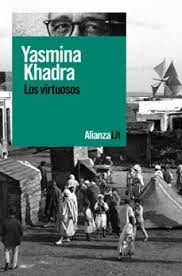
Original title: The virtuous
Year of publication: 2022
Translation: Wenceslao-Carlos Lozano
Valuation: recommendable
It’s curious. Despite Yasmina Khadra being one of the most read and translated Arab writers (if not the most), so far we have only reviewed one of her novels. We partially correct the “error”, which certainly extends to Arabic literature, with the review of her latest novel, this one. The virtuous located in the author’s native Algeria and set between approximately 1914 and 1950.
Starring Yacin, a sort of Ulysses of the sands of the Algerian desert subjected to tests that sometimes connect with those of the Homeric hero, The virtuous It could not have a more promising beginning: the aforementioned Yacin, a shepherd poorer than rats and more innocent than a newborn, is “summoned” by the caid, a kind of local leader, to replace his son in the army. Frenchman who will fight in the First World War. Through promises and threats, good old Yacin will have no choice but to embark on horror.
Once the European journey is over, Yacin returns to his native Algeria and the novel goes from being a “training” novel to being more of an “adventure” novel in which successive exiles and reunions, searches and discoveries, violence and havens of peace, They will make us accompany Yacin and some of his comrades-in-arms on their particular odyssey and will bring us closer to the Algerian history of the first half of the 20th century.
Despite that promising initial starting point, I think that the first part of the novel has a hard time getting off the ground. In particular, the war scenes remind me of movies already seen, books already read, and more and better told stories (direct testimonies such as The fear of Knight, No news at the front by Remarque or films like the unforgettable Paths of Glory). This does not mean that it is a bad first part of the novel, mind you. Its integration into the whole of the novel is more than correct and fulfills its function as an introduction of characters who will later be fundamental in the development of the novel and as a presentation of Yacin’s character.
From there, I think the novel grows. The tragic and, at the same time, ridiculous story of Yacin becomes the story of successive searches, internal or not, in an exploration of the contradictions of the human being in a very specific but quite universal historical and geographical context.
So, The virtuous It turns out to be a text in which tenderness and rawness complement each other, in which destiny plays a key role and that, despite a certain disproportion between the weight of some scenes and others (for example, Yacin’s more than 10 years in prison are dispatched in a handful of pages while other shorter and more “transitional” periods take up much more space) and some somewhat creaky expressions (I don’t know if they already came as standard or are things from the translation), it ends up leaving a good taste in the mouth .
Also from Yasmina Khadra in ULAD: The Madman with the Scalpel
Source: https://unlibroaldia.blogspot.com/2024/05/yasmina-khadra-los-virtuosos.html


